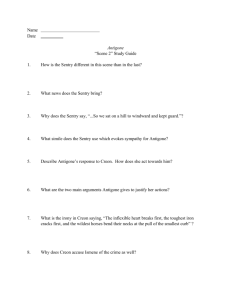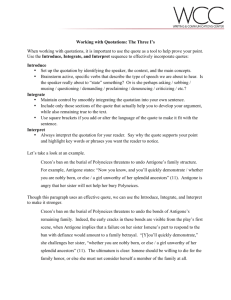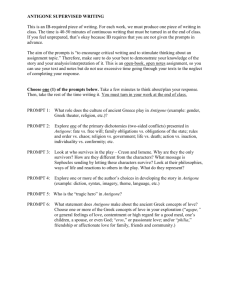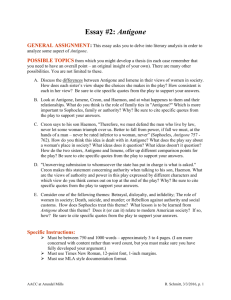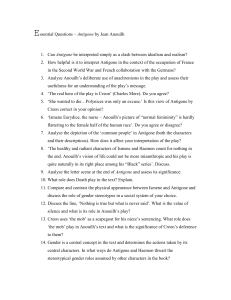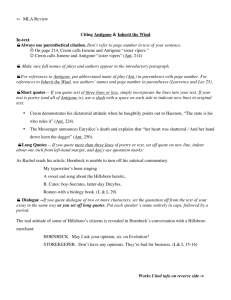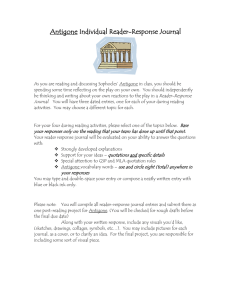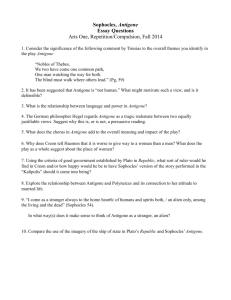uta hagen
advertisement
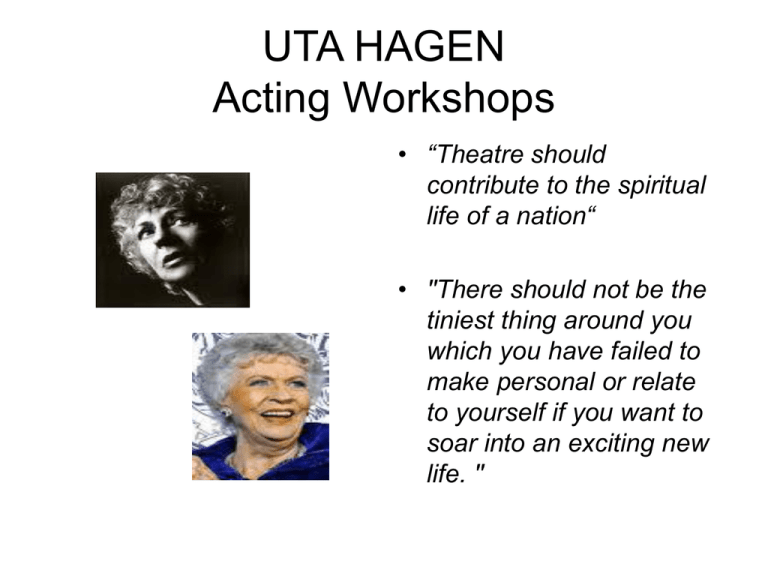
UTA HAGEN Acting Workshops • “Theatre should contribute to the spiritual life of a nation“ • "There should not be the tiniest thing around you which you have failed to make personal or relate to yourself if you want to soar into an exciting new life. " Background • Born 1914 – Died 2004 • German born, American Actress who, after gaining high acclaim (3 Tony Awards), gave up acting to pursue a career in directing and teaching • Taught actors such as Jack Lemmon, Mathew Broderick, Sigourney Weaver and Al Pacino Background cont. • Emotional Memory but…. Avoid examining experiences that you’ve never wanted to talk about — this isn’t psychotherapy! • Sense Memory • Using ‘I’ whenever you begin to become a character – ask questions of the text – ‘How old am I?’, ‘What do I look like?’ • Entrances - What did I just do? What am I doing now? What’s the first thing I want? Transference • 1. If I were… (characters name) • 2. You want to feel as if you're wearing the underpants of the character • 3. Tap into your own life experiences • 4. Run through the backstory and place the characters name with "I" • 5. Begin to make transferences from your own experiences to those in the play until they become synonymous with them. • 6. Start to ask yourself questions like "where was I born? And answer. Transference cont. • 7. Take each moment by moment and place a personal event or person to each one • 8. Particularization - make each event, person and place down to the smallest physical object as particular as possible, exploring these things in detail to discover in which way they are relevant to the character. • 9. Nothing should be left general or taken for granted. Everything must be specific. • 10. Examine all objects you will interact with in detail, down to exact specifics. • 11. These personal finds are simply possibilities or considerations. Don't be inflexible. Be open to other actors/director's suggestions and allow them to develop with others. • 12. You can construct elements of your past with friends or family members. Improv parts of your past. PURPOSE • To explore the feelings and emotions of a character within ‘Antigone’ in a different setting and time from the original text. • This would help an actor prepare in their performance of the role, to seek meaning in the emotion underneath the text, helping to portray a character of depth and in depth. This will be done through a ‘Telephone Conversation’ TASK You are having a telephone conversation as the character – if you choose to play Antigone, the person on the other end is Ismene and vice versa, if you choose to play Creon, the person on the other end is the Sentry. Using normal language you need to devise a conversation that expresses how you are feeling at the time. You must use your voice and your movement to convey this message. (All based on Prologue and Episode One) EXAMPLE • • • • • • • • • • Antigone: It’s me, are you alone? Ismene (on other end of phone): Yes hun, what’s wrong? Antigone: What do you mean what’s wrong? Have you not heard what’s happened? After everything else that’s gone on in our family, dad dying, mum killing ourselves and now this our two brothers dead?! Ismene: I know Antigone, it’s awful, but it’s happened we just need to accept things and move on. Antigone: Move on, move on! If you think I’m going to let that bastard bury Eteocles and just leave Polynices to rot because some stupid law says so, you can forget it! Ismene: But there’s nothing we can do! Antigone: Speak for yourself, I don’t care what the law says, some of us care more about their family than others! Etc. etc. Before you pick up the phone, you must communicate how you are feeling through your movement – how can you do this? You must use your voice and movement to help portray your emotions throughout the conversation but keep this as natural as possible. Think of experiences you can relate to.




